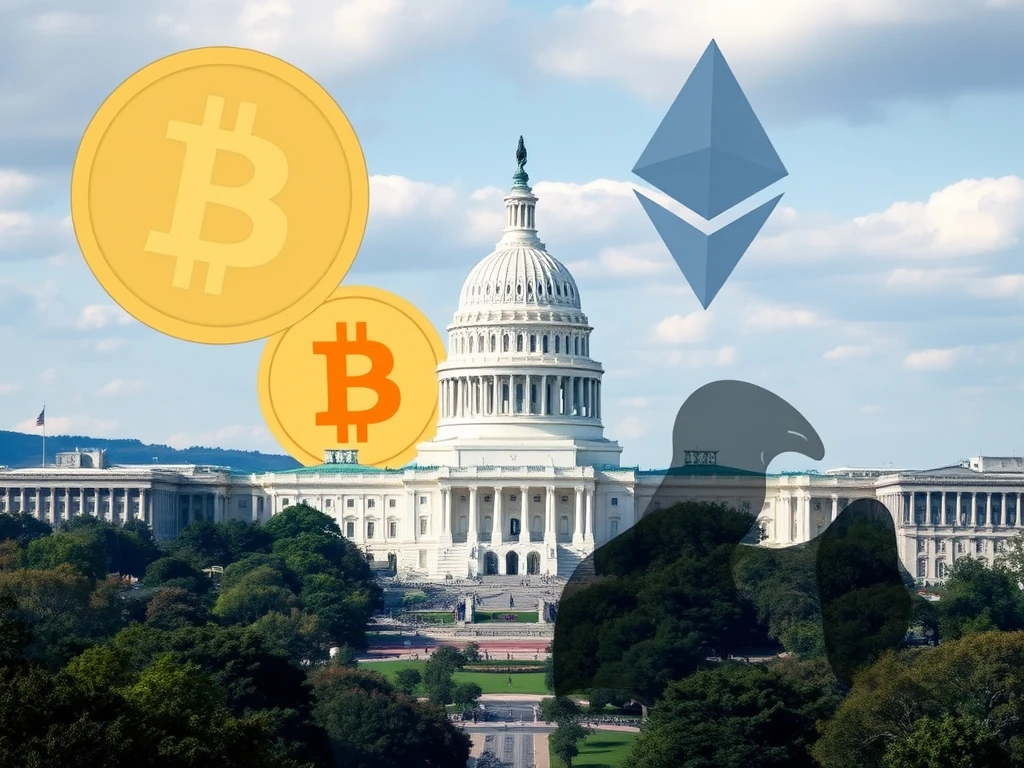Shocking Scrutiny: Trump Crypto Dealings Intersect with Digital Asset Bill Push

The intersection of politics and digital assets is heating up, specifically regarding former US President Donald Trump’s involvement. Recent developments highlight how Trump crypto dealings are drawing significant attention on Capitol Hill, potentially influencing the future of US digital asset legislation.
Why Trump’s Crypto Ties Matter for US Crypto Policy
Donald Trump’s growing connections to the cryptocurrency industry are becoming a focal point for lawmakers. His ventures, including offering White House access to top memecoin holders and his family’s backing of crypto firms, raise questions about potential conflicts of interest. This scrutiny is directly impacting discussions around establishing clear US crypto policy.
Democrats, led by figures like California Representative Maxine Waters, are particularly concerned. They are pushing for hearings to investigate whether Trump has personally benefited from crypto through his public position. This push comes as House Republicans advance their own legislative agenda for digital assets.
House Republicans Unveil a Digital Asset Bill
On May 5, Republican lawmakers in the House of Representatives released a draft of a comprehensive digital asset bill. This proposed legislation aims to create a clearer regulatory framework for cryptocurrencies in the United States. Key aspects of the draft bill include:
- Clarifying the roles of the Securities and Exchange Commission (SEC) and the Commodity Futures Trading Commission (CFTC) regarding digital assets.
- Requiring the SEC and CFTC to jointly define digital commodities.
- Stating that transactions involving digital commodities are not considered investment contracts if the purchaser doesn’t hold an interest in the project’s revenues, profits, or assets.
Interestingly, some Republican lawmakers advocating for this bill have echoed sentiments similar to Trump’s stated goal of making the US a “crypto capital.”
Scrutiny and Concerns Over Trump Conflict of Interest
The timing of the Republican bill coincides with increased scrutiny over a potential Trump conflict of interest related to his crypto activities. Democrats are reportedly planning alternative hearings to specifically explore Trump’s and his family’s financial ties to the crypto industry.
Concerns stem from several areas:
- The widely reported dinner offered to top holders of a Trump-themed memecoin.
- His family’s association with firms launching stablecoins.
- An incident involving a $2 billion investment in Binance settled using a stablecoin, connected to an Abu Dhabi firm backed by Trump associates.
Representative Waters has reportedly requested that any proposed digital asset legislation explicitly address and prevent potential conflicts of interest where Trump could personally gain from crypto ventures.
How Does This Impact Crypto Regulation?
The political maneuvering and the focus on Trump’s crypto dealings complicate the path forward for clear crypto regulation. While Republicans are pushing for a framework designed to foster innovation, Democrats are prioritizing oversight and preventing potential abuses of power.
Some members of Congress, even within the Republican party, have expressed discomfort with Trump’s direct engagement with specific crypto projects, suggesting it blurs lines and could be perceived as selling access.
The current political climate, with Republicans controlling the House, Senate, and presidency, creates a unique dynamic where the President’s personal interests can become a significant factor in legislative debates.
What Happens Next?
This situation is still developing. The proposed Republican digital asset bill will face debate and potential amendments. Meanwhile, Democratic efforts to highlight potential conflicts of interest are likely to continue, adding pressure to the legislative process. The outcome will significantly shape the regulatory environment for cryptocurrencies in the United States.
In summary, Donald Trump’s increasing visibility in the crypto space is forcing a collision between his personal financial interests and the broader need for clear US crypto policy. As House Republicans advance their legislative efforts, Democratic scrutiny over a potential Trump conflict of interest adds a layer of complexity, making the future of crypto regulation uncertain but undeniably linked to political developments.








